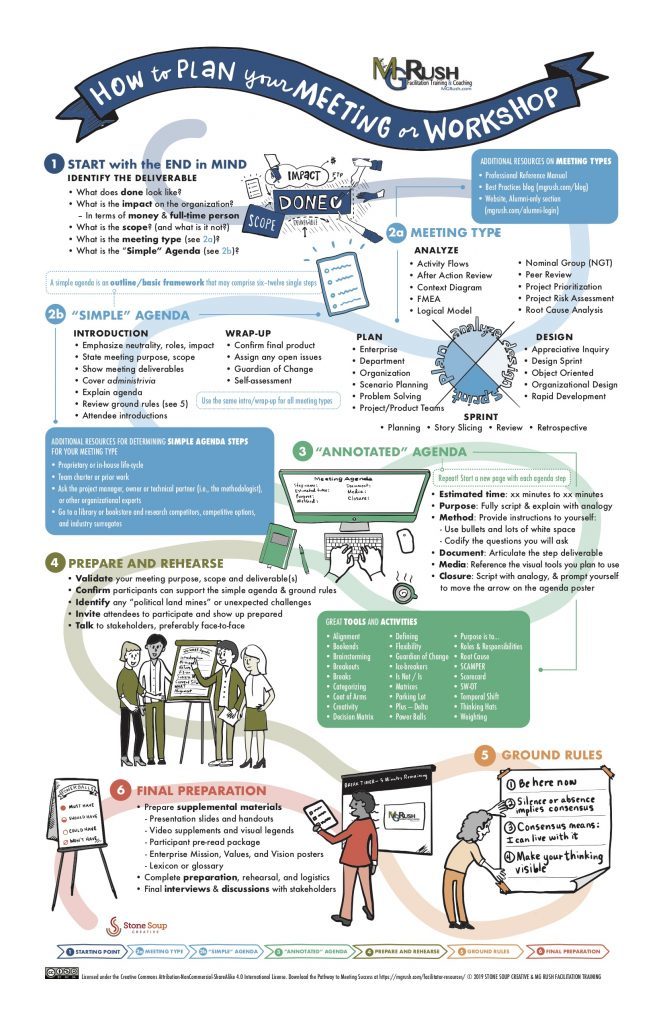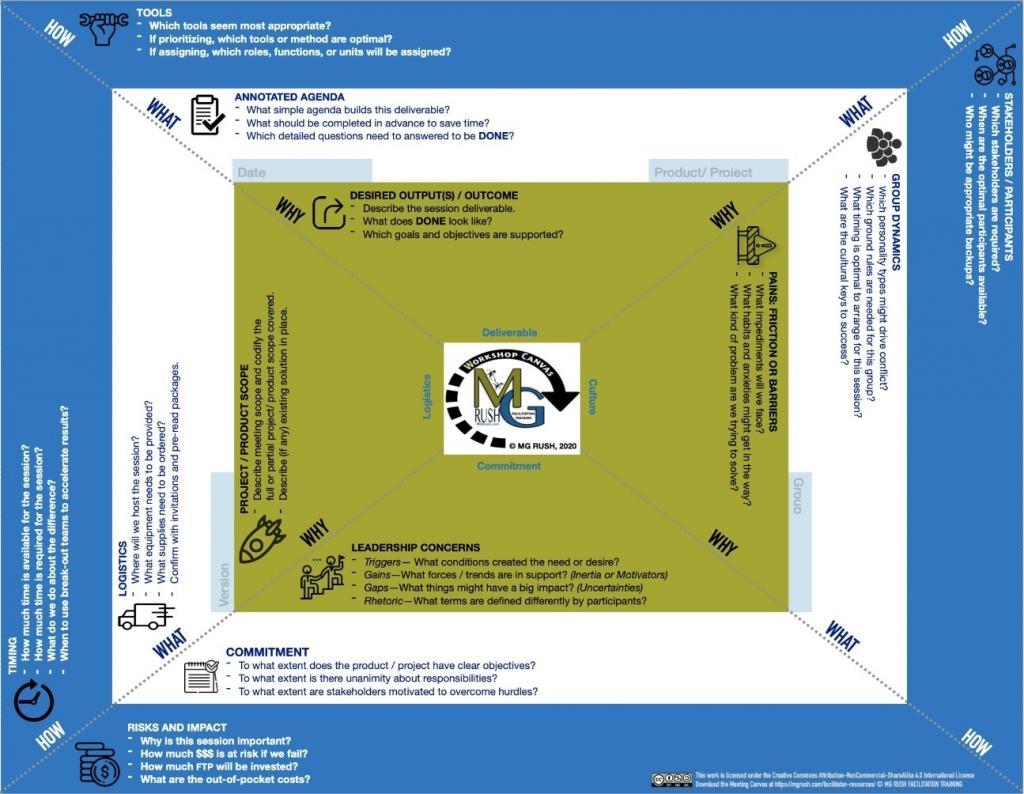Over the years, students and alumni have clamored for a simple reference sheet of our curriculum and how to prepare for a meeting. Consequently, we think we have it now and hope you agree.
Meetings can be expensive and wasteful, especially when poorly prepared. Therefore, download a PDF of the Meeting Pathway guide and Workshop Canvas on our Facilitator Resources page. Alternatively, go to the Alumni section of our website. Additionally, posters are available for purchase in assorted sizes and formats at our Facilitation Store.
- Graphic Meeting Pathway to thoroughly prepare and ensure meeting success.
- The Workshop Canvas aligns expectations for meeting and workshop charters.
Meeting Pathway to Success
Julia Reich, graphic recorder of Stone Soup Creative, should be applauded (and hired) because her Meeting Pathway to Success provides a simple-to-follow guide for complex events called meetings (or workshops). Primarily intended for individuals working on their own, Meeting Pathway begins with the end in mind (DONE). Oddly, however, it concludes with your final preparatory activities. Therefore, follow the six steps in the Meeting Pathway to remember everything critical to the success of your meetings (or workshops).
The Meeting Pathway provides a color-coded, single-page reference sheet that stresses the significant components of an important meeting, and includes:
- Meeting types
- Introductory and wrap activities
- Simple agenda instructions
- Annotated agenda components
- Rehearsal considerations
- Tools and activities
- Ground rules
- Visual prompts reminder
Workshop Canvas
We are also introducing the first and only structured Workshop Canvas. Primarily intended for teams coordinating critical workshops, it similarly includes:
Use the Workshop Canvas to supplement the Meeting Pathway to reinforce clarity and help build consensus around the components of a successful meeting from your group’s perspective. The Workshop Canvas establishes a consensual tone based on transparency and evidence-based decision-making. Consider ordering a large poster version for use with Post-It® Notes, then photograph your ongoing development, and share it with other stakeholders as appropriate.
The Workshop Canvas includes 37 preparatory considerations.
Review and adapt the 37 questions for each meeting or workshop. Note that the three vectors of leadership [WHY}, facilitation [WHAT], and methodology [HOW] are sequenced. Additionally, they cut across four primary dimensions including Deliverable, Culture, Commitment, and Logistics.
MGRUSH alumni have immediate access to a brochure that includes both the Meeting Pathway (11 x 17) and the Workshop Canvas.
Poster versions of both are also available in the Facilitation Store in paper quality from a simple matte finish to photographic glossy on foam mount. For more information and prices go to Meeting Pathway or Workshop Canvas.
______
Don’t ruin your career by hosting bad meetings. Sign up for a workshop or send this to someone who should. MGRUSH workshops focus on meeting design and practice. Each person practices tools, methods, and activities daily during the week. Therefore, while some call this immersion, we call it the road to building high-value facilitation skills.
Our workshops also provide a superb way to earn up to 40 SEUs from the Scrum Alliance, 40 CDUs from IIBA, 40 Continuous Learning Points (CLPs) based on Federal Acquisition Certification Continuous Professional Learning Requirements using Training and Education activities, 40 Professional Development Units (PDUs) from SAVE International, as well as 4.0 CEUs for other professions. (See workshop and Reference Manual descriptions for details.)
Want a free 10-minute break timer? Sign up for our once-monthly newsletter HERE and receive a free timer along with four other of our favorite facilitation tools.
______
With Bookmarks no longer a feature in WordPress, we need to append the following for your benefit and reference
- 20 Prioritization Techniques = https://foldingburritos.com/product-prioritization-techniques/
- Creativity Techniques = https://www.mycoted.com/Category:Creativity_Techniques
- Facilitation Training Calendar = https://mgrush.com/public-facilitation-training-calendar/
- Liberating Structures = http://www.liberatingstructures.com/ls-menu
- Management Methods = https://www.valuebasedmanagement.net
- Newseum = https://www.freedomforum.org/todaysfrontpages/
- People Search = https://pudding.cool/2019/05/people-map/
- Project Gutenberg = http://www.gutenberg.org/wiki/Main_Page
- Scrum Events Agendas = https://mgrush.com/blog/scrum-facilitation/
- Speed test = https://www.speedtest.net/result/8715401342
- Teleconference call = https://youtu.be/DYu_bGbZiiQ
- The Size of Space = https://neal.fun/size-of-space/
- Thiagi/ 400 ready-to-use training games = http://thiagi.net/archive/www/games.html
- Visualization methods = http://www.visual-literacy.org/periodic_table/periodic_table.html#
- Walking Gorilla = https://youtu.be/vJG698U2Mvo

Terrence Metz, president of MG RUSH Facilitation Training, was just 22-years-old and working as a Sales Engineer at Honeywell when he recognized a widespread problem—most meetings were ineffective and poorly led, wasting both time and company resources. However, he also observed meetings that worked. What set them apart? A well-prepared leader who structured the session to ensure participants contributed meaningfully and achieved clear outcomes.
Throughout his career, Metz, who earned an MBA from Kellogg (Northwestern University) experienced and also trained in various facilitation techniques. In 2004, he purchased MG RUSH where he shifted his focus toward improving established meeting designs and building a curriculum that would teach others how to lead, facilitate, and structure meetings that drive results. His expertise in training world-class facilitators led to the 2020 publication of Meetings That Get Results: A Guide to Building Better Meetings, a comprehensive resource on effectively building consensus.
Grounded in the principle that “nobody is smarter than everybody,” the book details the why, what, and how of building consensus when making decisions, planning, and solving problems. Along with a Participant’s Guide and supplemental workshops, it supports learning from foundational awareness to professional certification.
Metz’s first book, Change or Die: A Business Process Improvement Manual, tackled the challenges of process optimization. His upcoming book, Catalyst: Facilitating Innovation, focuses on meetings and workshops that don’t simply end when time runs out but conclude with actionable next steps and clear assignments—ensuring progress beyond discussions and ideas.





